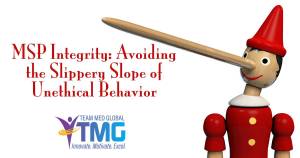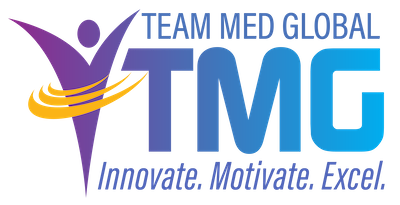 We’ve all heard (or witnessed) the horror stories: The MSP who embezzled money, who cheated on their remote timecard, who misrepresented facts to make themselves look better, or who falsified their credentials on their resume. These behaviors don’t reflect the integrity exhibited by the vast majority of those in our profession, yet it’s worth examining what integrity means to us and why it’s important.
We’ve all heard (or witnessed) the horror stories: The MSP who embezzled money, who cheated on their remote timecard, who misrepresented facts to make themselves look better, or who falsified their credentials on their resume. These behaviors don’t reflect the integrity exhibited by the vast majority of those in our profession, yet it’s worth examining what integrity means to us and why it’s important.
Merriam-Webster says that “integrity implies a trustworthiness and incorruptibility to a degree that one is incapable of being false to a trust, responsibility, or pledge.” While it can be argued that each one of us is capable of acting unethically given extreme circumstances (say, in order to protect a child), it’s inarguable that we should each strive to act with integrity in our work and in our lives. Perhaps a better working definition of integrity is “to always do what is right even when no one is looking.”
A Slippery Slope
Unethical behavior can be a slippery slope. We may never embezzle a dime or lie about our credentials, but there may be times we exhibit less-than-stellar ethics, such as:
Not contributing to team efforts: When we sit back and let others do the work, we undermine our department’s camaraderie by causing resentment. Over time, this can lead to burnout and staff turnover.
Overcommitting: We may have the best of intentions but an unrealistic picture of our capacity, or we may simply have a hard time saying “no.” Whatever the reason, overcommitment leads to missed deadlines or subpar deliverables thrown together at the last minute.
Exploiting organizational resources: Every healthcare organization is tasked with doing more with less. When we fudge our expense account or grab some office supplies on the way out the door, the impact may seem insignificant, but multiply that behavior across departments and soon meaningful organizational initiatives can’t be launched due to lack of resources.
Why We Slide
The overwhelming majority of MSPs are goodhearted people who do exemplary work. Yet even the best people can make poor choices that impinge their integrity. Sometimes, those decisions arise out of personal financial or psychological needs. Other times, an organization’s culture contributes to ethical breaches. This happens due to:
Unrealistic expectations: When an MSP is responsible for more than any one person can reasonably handle, it’s tempting to cut corners. It could be that we are driven to live up to the expectations of others or that we fear being fired if we don’t deliver.
Lack of clear direction: Healthcare organizations must abide by strict regulatory compliance initiatives, but MSP ethical compliance can get short shrift. When integrity isn’t prioritized and rewarded, it can be difficult for MSPs to know the lines they should not cross.
Inappropriate loyalty: An organization with a “whatever it takes” culture can create a sense of misplaced loyalty. This can lead to unethical behavior in MSPs who want to please leadership or physicians, or in MSPs who are hesitant to report such misconduct.
Inadequate recognition: When an organization doesn’t recognize the important work of MSPs or the contributions made by individuals, it’s easier to rationalize taking what hasn’t been given.
Shoring Up Our Foundation
There are several steps we can take to prevent ourselves from taking the first (or second) step down the slippery slope.
Skill building: Even though there’s a nationwide MSP shortage that allows us to be relatively choosy when looking for work, it may be tempting to pad a resume in order to feel more competitive. By instead choosing to build our skills with educational offerings, we can include our very real skillsets on our resumes.
Certification: The pathway to a credential – whether TMG’s Executive MSP or Executive Payer Enrollment Professional credential or a professional association certification – can feel arduous, but your credential will give you the recognition you deserve for your knowledge and experience.
Organizational support for professional development: Organizations that have budgets for MSP professional development engender the right kind of loyalty by demonstrating that they value their workforce and are dedicated to the long-term growth of their employees.
Mentoring: A great mentor – either within or outside of your organization – can act as your north star from an integrity standpoint. They can be a sounding board for ethical dilemmas you face and can expand your network of people who exhibit good character.
Under-promise and over-deliver: While promising the moon may please the person asking, being realistic about what you’re able to do and when you’re able to do it is less stressful for both you and the requester. Being able to consistently meet or beat expectations aligns with ethical principles and serves you well. If your departmental culture is rife with unrealistic expectations, work with your supervisor to design more practical goals and objectives.
See something, say something: There’s a difference between being a tattletale and protecting your organization’s interests. As an MSP, you are a sentinel of patient safety. If you see something untoward – like credentialing shortcuts – the ethical thing to do is report it.
The Rewards of Integrity
While it’s true that integrity is its own reward, as MSPs we can witness other benefits of working ethically. When people know they can trust you and rely on you, you become the go-to person in the department. Your honesty is valued, so even if you are the bearer of a difficult message, the person you’re speaking with knows that you’re a straight shooter without a hidden agenda. As others’ respect for you increases, you are more valued within your organization. You’re more likely to be entrusted with sensitive assignments and offered opportunities for career advancement.
Ultimately, our reputation precedes us, so we are uniquely positioned to advance our profession. When we work with integrity – doing what’s right even when no one is looking – we are valued colleagues and leaders, as well as role models to newer MSPs.
TMG provides many resources for MSPs seeking to shore up their foundations. TMG University offers certification preparation, the Executive MSP credential, and the Executive Payer Enrollment Professional credential. TMG delivers mentorship through one-on-one coaching, shared wisdom and support through The TMG Zone, and opportunities to expand your horizons through working part- or full-time with ProVISIONary Staffing.
